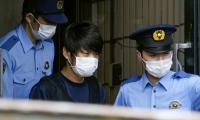Primary and secondary terrorism: the circles of hell
Islamabad diaryThe MQM is a problem and has been a problem. But let’s be clear about one thing: it is a secondary problem, as are the gangs of Lyari, as is extortion in Karachi. The Karachi police if properly led, which it is not, and properly motivated, which again it
By Ayaz Amir
May 15, 2015
Islamabad diary
The MQM is a problem and has been a problem. But let’s be clear about one thing: it is a secondary problem, as are the gangs of Lyari, as is extortion in Karachi. The Karachi police if properly led, which it is not, and properly motivated, which again it is not, should be sufficient unto these secondary problems.
For all practical purposes the Rangers direct Karachi policing. And the Rangers’ approach has yielded results, pushing the MQM into a defensive corner. Suspects have been picked up, their interrogation opening up fresh fields of inquiry. This is then the right approach and Rangers and corps headquarters should not be unduly worried by sniping criticism.
Pakistan’s primary problem, however, is different. It is the mindless extremism – a throwback to the dark ages – inspired by, and cloaked in, distorted religiosity. In whatever way this phenomenon began – and let’s not retrace our steps over the familiar historical ground – we are now stuck with it. This land and its people, with whose destiny vision-less leadership has played havoc over the years, will know no peace until, in God’s own time, our minds open up and the roots of ‘jihad’ are pulled up from the soil and this phenomenon is eliminated.
The quest for ‘jihad’, and for such misty concepts as strategic depth, pushed Pakistan over the borders of rationality. At long last this country, leaving those precipices behind, is straining every muscle and nerve to return to the shores of sanity. In large part it is trying to bid a farewell to ‘jihad’ – and succeeding on the western marches, along the Durand Line, but still remaining stuck in the old mumbo-jumbo when it comes to the eastern front, with India.
But who says that any return journey from hell is easy? The demons of ‘jihad’ are not dead. They lie scattered, hidden in burrows and holes, all over the national landscape. From north to south, east to west, their support bases exist. This is going to be a long fight, grim and bitter, and there will be casualties and suffering and sorrow along the way. Tragedies like the Peshawar school massacre and now the attack on the Ismaili bus in Karachi will happen – until we see the last of this scourge whose roots we watered with our own hands. This may sound callous but there is no other way of looking at it.
Look at the wages of disorder and civil strife in such fractured societies as those of Libya, Iraq and Syria…and now Yemen. Let the Pakistani weasel class get this into its head: curse the Pakistani military as much as you may like but be sensible of the fact that if Pakistan, despite the smouldering fires of Afghanistan and the staggering incompetence of its leaders, has not turned into another Iraq or Syria it is only because of the army. And we should thank our stars that the army has rehabilitated its image and it has a chief, an active chief always on the go, who is winning that elusive thing called public trust.
For too long there was a disconnect between the army and society at large – because of martial laws, etc. Mercifully, that phase is now over. It is not clever propaganda which has healed this breach but blood and sacrifice on the army’s part in the ongoing war against extremism. Terrorist incidents are still taking place but on the calculus of Iraq and Syria we should count ourselves lucky that despite everything the worst which could happen here is not happening.
So what then is our primary problem? It is represented by those forces which are upholding the banner of extremism: the Tehreek-e-Taliban Pakistan, its mutants and variations like the Punjabi Taliban, the various Lashkars and Jaishes whose specialisation is sectarianism, and now the emergence of elements professing allegiance to Daish or the Islamic State. Whoever was behind the attack on the Ismaili bus, the pamphlet left behind makes for interesting reading.
In English which is good, it delivers a warning to Rawafidh, Ahle-Tasheeh…rawafidh meaning ‘those who have taken a separate path’, a term first coined, I have been informed, by Ibn Taymiyya. It goes on to say that this attack is in retaliation for: “The barbaric atrocities against the Ahl Sunnat wal Jamaat by the Rawafidh, especially against the women, in the Levant, Iraq and Yemen. The martyrdom of innocent Muslims by the Rawafidh in Raja Bazar, Rawalpindi. The martyred students of Lal Masjid. Martyrdom of mujahideen in Keamari and other fake encounters by scum like Rao Anwar…”
What did the poor Ismailis have to do with the Levant, Raja Bazar, Lal Masjid and the police officer named in the pamphlet? Where stands the Levant and where Karimabad where this atrocity took place? By what code of honour do these purported soldiers of Islam conduct themselves? Yet there are frenzied souls here convinced that killing Hazaras and Gilgitis or Baltis, and now Ismailis because they are all Rawafidh, opens up for them the gates of paradise. What dragon’s teeth have we scattered on our soil? We set out to create a nation on the basis of religion. Over time, through a mixture of folly and short-sightedness, we have harvested a multiplicity of fanaticisms.
Let the Rangers keep a strict and unerring eye on the MQM because the MQM has a past and a history of violence. But let the army and the intelligence agencies keep their focus on the primary problem, the threat from extremism. The extremists when they have the upper hand show no mercy…mercy not existing in their creed. Even when it comes to killing women and children their fingers are steady, not hesitating or faltering. Pity has no place in their hearts, and all, mind you, for the greater glory of the faith. How did we end up producing people subscribing to such nonsense?
Not to forget the larger context, the Pakistani state had gone flabby and weak, for too long temporising with extremism, leaders (both military and civil) making excuses for the Taliban, government worthies virtually shedding tears when a terrorist kingpin like Hakeemullah Mehsud was killed in a drone attack. Soldiers would be slaughtered, their throats cut, and our leaders would chant the mantra of peace talks. We have to be grateful to the Taliban and their allies that they spread such mayhem, so overplayed their hand, that a state which to all appearances had lost the will to resist has perforce recovered spirit and fortitude.
Raheel Sharif is the face of the new mood in the armed forces. Like it or not, a cult is building up around him…a cult a product not of the ISPR but of circumstances. (But let there be always someone whispering in his ear: Remember Caesar, thou art mortal.)
But even as the army, with vital help from the air force, and agencies and Rangers are engaged in this war with so many fronts and so many sides to it, the least the civilians can do is get their photo-ops right. There is nothing wrong with a working lunch but at the very moment when all TV channels are covering the bus massacre, for the assembled national leadership in Islamabad – another of those all-parties conferences – to be seen stuffing their mouths with chicken and dessert doesn’t quite convey the right impression. Did no one have the sense to tell the cameras to get out of the hall when the lunch trays were being brought in? If this is the genius we show when it comes to small things, how do we figure getting larger things right?
Tailpiece: In my piece on Hersh last Tuesday, I asked whether the doctor Maj Aamer Aziz mentioned in Hersh’s account was the well-known orthopaedic surgeon from Lahore. Prof Dr Amer Aziz has rightly taken umbrage at this suggestion and says he is “astounded” at the insinuation. My unreserved apologies to him. Very sorry.
Email: bhagwal63@gmail.com
The MQM is a problem and has been a problem. But let’s be clear about one thing: it is a secondary problem, as are the gangs of Lyari, as is extortion in Karachi. The Karachi police if properly led, which it is not, and properly motivated, which again it is not, should be sufficient unto these secondary problems.
For all practical purposes the Rangers direct Karachi policing. And the Rangers’ approach has yielded results, pushing the MQM into a defensive corner. Suspects have been picked up, their interrogation opening up fresh fields of inquiry. This is then the right approach and Rangers and corps headquarters should not be unduly worried by sniping criticism.
Pakistan’s primary problem, however, is different. It is the mindless extremism – a throwback to the dark ages – inspired by, and cloaked in, distorted religiosity. In whatever way this phenomenon began – and let’s not retrace our steps over the familiar historical ground – we are now stuck with it. This land and its people, with whose destiny vision-less leadership has played havoc over the years, will know no peace until, in God’s own time, our minds open up and the roots of ‘jihad’ are pulled up from the soil and this phenomenon is eliminated.
The quest for ‘jihad’, and for such misty concepts as strategic depth, pushed Pakistan over the borders of rationality. At long last this country, leaving those precipices behind, is straining every muscle and nerve to return to the shores of sanity. In large part it is trying to bid a farewell to ‘jihad’ – and succeeding on the western marches, along the Durand Line, but still remaining stuck in the old mumbo-jumbo when it comes to the eastern front, with India.
But who says that any return journey from hell is easy? The demons of ‘jihad’ are not dead. They lie scattered, hidden in burrows and holes, all over the national landscape. From north to south, east to west, their support bases exist. This is going to be a long fight, grim and bitter, and there will be casualties and suffering and sorrow along the way. Tragedies like the Peshawar school massacre and now the attack on the Ismaili bus in Karachi will happen – until we see the last of this scourge whose roots we watered with our own hands. This may sound callous but there is no other way of looking at it.
Look at the wages of disorder and civil strife in such fractured societies as those of Libya, Iraq and Syria…and now Yemen. Let the Pakistani weasel class get this into its head: curse the Pakistani military as much as you may like but be sensible of the fact that if Pakistan, despite the smouldering fires of Afghanistan and the staggering incompetence of its leaders, has not turned into another Iraq or Syria it is only because of the army. And we should thank our stars that the army has rehabilitated its image and it has a chief, an active chief always on the go, who is winning that elusive thing called public trust.
For too long there was a disconnect between the army and society at large – because of martial laws, etc. Mercifully, that phase is now over. It is not clever propaganda which has healed this breach but blood and sacrifice on the army’s part in the ongoing war against extremism. Terrorist incidents are still taking place but on the calculus of Iraq and Syria we should count ourselves lucky that despite everything the worst which could happen here is not happening.
So what then is our primary problem? It is represented by those forces which are upholding the banner of extremism: the Tehreek-e-Taliban Pakistan, its mutants and variations like the Punjabi Taliban, the various Lashkars and Jaishes whose specialisation is sectarianism, and now the emergence of elements professing allegiance to Daish or the Islamic State. Whoever was behind the attack on the Ismaili bus, the pamphlet left behind makes for interesting reading.
In English which is good, it delivers a warning to Rawafidh, Ahle-Tasheeh…rawafidh meaning ‘those who have taken a separate path’, a term first coined, I have been informed, by Ibn Taymiyya. It goes on to say that this attack is in retaliation for: “The barbaric atrocities against the Ahl Sunnat wal Jamaat by the Rawafidh, especially against the women, in the Levant, Iraq and Yemen. The martyrdom of innocent Muslims by the Rawafidh in Raja Bazar, Rawalpindi. The martyred students of Lal Masjid. Martyrdom of mujahideen in Keamari and other fake encounters by scum like Rao Anwar…”
What did the poor Ismailis have to do with the Levant, Raja Bazar, Lal Masjid and the police officer named in the pamphlet? Where stands the Levant and where Karimabad where this atrocity took place? By what code of honour do these purported soldiers of Islam conduct themselves? Yet there are frenzied souls here convinced that killing Hazaras and Gilgitis or Baltis, and now Ismailis because they are all Rawafidh, opens up for them the gates of paradise. What dragon’s teeth have we scattered on our soil? We set out to create a nation on the basis of religion. Over time, through a mixture of folly and short-sightedness, we have harvested a multiplicity of fanaticisms.
Let the Rangers keep a strict and unerring eye on the MQM because the MQM has a past and a history of violence. But let the army and the intelligence agencies keep their focus on the primary problem, the threat from extremism. The extremists when they have the upper hand show no mercy…mercy not existing in their creed. Even when it comes to killing women and children their fingers are steady, not hesitating or faltering. Pity has no place in their hearts, and all, mind you, for the greater glory of the faith. How did we end up producing people subscribing to such nonsense?
Not to forget the larger context, the Pakistani state had gone flabby and weak, for too long temporising with extremism, leaders (both military and civil) making excuses for the Taliban, government worthies virtually shedding tears when a terrorist kingpin like Hakeemullah Mehsud was killed in a drone attack. Soldiers would be slaughtered, their throats cut, and our leaders would chant the mantra of peace talks. We have to be grateful to the Taliban and their allies that they spread such mayhem, so overplayed their hand, that a state which to all appearances had lost the will to resist has perforce recovered spirit and fortitude.
Raheel Sharif is the face of the new mood in the armed forces. Like it or not, a cult is building up around him…a cult a product not of the ISPR but of circumstances. (But let there be always someone whispering in his ear: Remember Caesar, thou art mortal.)
But even as the army, with vital help from the air force, and agencies and Rangers are engaged in this war with so many fronts and so many sides to it, the least the civilians can do is get their photo-ops right. There is nothing wrong with a working lunch but at the very moment when all TV channels are covering the bus massacre, for the assembled national leadership in Islamabad – another of those all-parties conferences – to be seen stuffing their mouths with chicken and dessert doesn’t quite convey the right impression. Did no one have the sense to tell the cameras to get out of the hall when the lunch trays were being brought in? If this is the genius we show when it comes to small things, how do we figure getting larger things right?
Tailpiece: In my piece on Hersh last Tuesday, I asked whether the doctor Maj Aamer Aziz mentioned in Hersh’s account was the well-known orthopaedic surgeon from Lahore. Prof Dr Amer Aziz has rightly taken umbrage at this suggestion and says he is “astounded” at the insinuation. My unreserved apologies to him. Very sorry.
Email: bhagwal63@gmail.com
-
 Prince Harry Receives Praises For Exposing Dark Side Of British Tabloids
Prince Harry Receives Praises For Exposing Dark Side Of British Tabloids -
 Andrew Forces Beatrice, Eugenie To Lose $60 Million Safety Net Saved For Retirement
Andrew Forces Beatrice, Eugenie To Lose $60 Million Safety Net Saved For Retirement -
 Nvidia CEO Jensen Huang To Visit China To Push Re-entry Into AI Chip Market
Nvidia CEO Jensen Huang To Visit China To Push Re-entry Into AI Chip Market -
 U.S. On Verge Of Losing Measles-free Title Due To Outbreak
U.S. On Verge Of Losing Measles-free Title Due To Outbreak -
 Harry Styles Excites Fans As He Announces Release Date Of New Song
Harry Styles Excites Fans As He Announces Release Date Of New Song -
 Japan’s Ex-PM Shinzo Abe’s Killer Is Set To Be Sentenced: How Much Punishment Could He Face?
Japan’s Ex-PM Shinzo Abe’s Killer Is Set To Be Sentenced: How Much Punishment Could He Face? -
 Prince Harry, Meghan Markle’s Return To UK Could Create Royal Family Dilemma
Prince Harry, Meghan Markle’s Return To UK Could Create Royal Family Dilemma -
 Prince Harry Turns Troubled With No Sense Of Home: ‘Isolation Is Getting To Him Mentally’
Prince Harry Turns Troubled With No Sense Of Home: ‘Isolation Is Getting To Him Mentally’ -
 Vitamin D Link To Respiratory Diseases Will Shock You
Vitamin D Link To Respiratory Diseases Will Shock You -
 A$AP Rocky Gives His Take On Children's Budding Personalities
A$AP Rocky Gives His Take On Children's Budding Personalities -
 Elijah Wood On Return To 'Lord Of The Rings' Universe
Elijah Wood On Return To 'Lord Of The Rings' Universe -
 Princess Beatrice, Eugenie Resort To Begging Sarah Ferguson: 'It'll Bring Disaster For The Whole Family'
Princess Beatrice, Eugenie Resort To Begging Sarah Ferguson: 'It'll Bring Disaster For The Whole Family' -
 Jenny Slate Hails Blake Lively Amid Lawsuit Against Justin Baldoni
Jenny Slate Hails Blake Lively Amid Lawsuit Against Justin Baldoni -
 Sophie Wessex Shares 'frustration' From Early Days In Royal Family
Sophie Wessex Shares 'frustration' From Early Days In Royal Family -
 Jason Momoa's Aquaman Unseen Snap Revealed
Jason Momoa's Aquaman Unseen Snap Revealed -
 Prince Harry Taught Only Way King Charles 'will Take Him Seriously'
Prince Harry Taught Only Way King Charles 'will Take Him Seriously'



